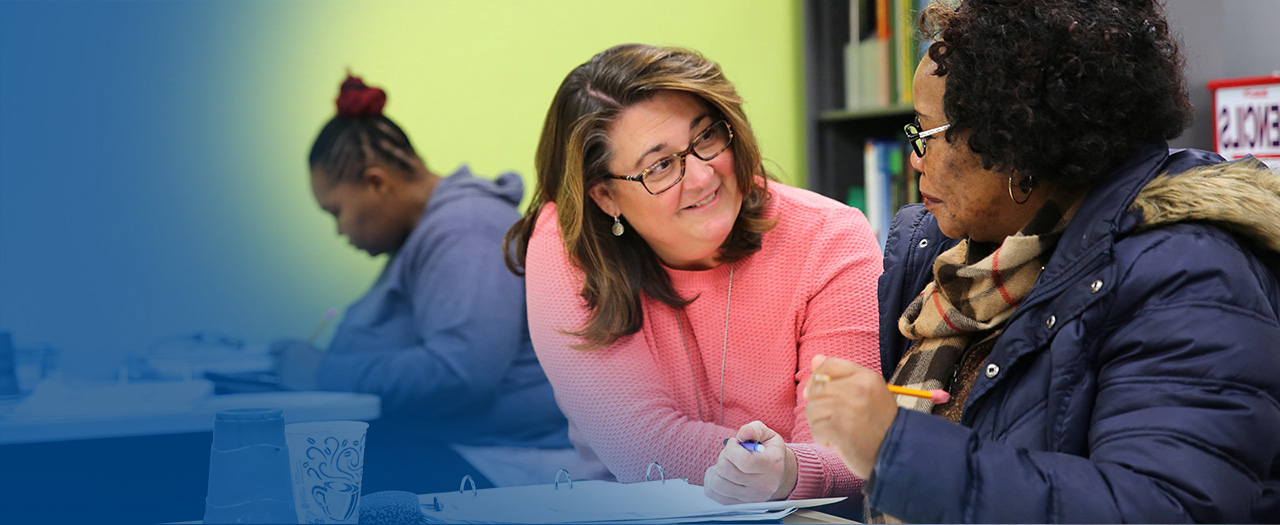
Academic Support
Committed to Helping You Succeed
Achieve your academic goals with WCTC’s comprehensive support services. Whether you need assistance with writing, math, science or study skills, we offer a variety of resources to support your learning journey. Discover how we can help you reach your full potential.
WCTC Academic Support
 academic-assist@wctc.edu
academic-assist@wctc.edu 262.691.5311
262.691.5311 Building B, Room B-110
Building B, Room B-110
Academic Assistance Center
Looking for help in reading, writing or other coursework? The Academic Assistance Center is here to help! Our friendly staff provides individualized instruction designed to meet the unique needs of each student.
Get help with:
- Reading comprehension and note-taking skills
- Test preparation and time management
- Writing clarity, grammar, punctuation, outlining and APA style
- Using academic technology and learning software
- General skill-building and support for specific courses
- And more!
Contact: academic-assist@wctc.edu | 262.691.5294
Location: Building B, Room B-110O
In Person Drop-in Hours
Winter Interim 2025-26: December 15 - January 9
All hours by appointment on Calendly/Zoom
January 20 - May 15
- Monday - Thursday: 8:30 a.m. - 7:30 p.m.
- Friday: 8:30 a.m. - 1 p.m.
Summer Interim 2026: May 18 - June 5
All hours by appointment on Calendly/Zoom
Virtual Hours - By Appointment
Peer Tutoring
Don't wait until it’s too late. If you’re struggling with a course, sign up for a peer tutor. WCTC offers this free service for specific technical-level courses. Peer tutors are students who have been successful in a particular subject and who have been recommended by faculty. Peer tutors do not teach, but instead offer valuable guidance and assistance.
Why Use a Peer Tutor?
- You've already consulted your instructor and Academic Support and still need extra help.
- Strengthen your knowledge of the material.
- Learn different study skills.
Become a Peer Tutor
As a peer tutor, you have the opportunity to build your self-confidence and practice listening skills, goal setting, problem-solving, interpersonal and oral communication skills, empathy and patience. You'll also strengthen your own study skills and knowledge of the material. To become a peer tutor, you must meet the following qualifications:
- Competent completion ("A" or "B") in the course you wish to tutor
- Instructor recommendation from the completed course
- Availability to tutor on campus
- Flexibility and willingness to help others
Whether you’re taking a math course or preparing for an apprenticeship or placement test, you can get the extra math help you need here. Our instructors provide academic support and additional resources to help clarify and reinforce concepts.
Contact: mathlab@wctc.edu | 262.691.5311
Location: B-110X
Basic Math
This one-credit support course covers fractions, decimals, percentages, ratio and proportion, scientific notation, signed whole numbers, and simple algebraic equations.
In Person Drop-in Hours
January 20 - May 15
- Monday - Thursday: 8:30 a.m. - 7:30 p.m.
- Friday: 8:30 a.m. - 1 p.m.
Virtual Hours - By Appointment
January 20 - May 15
- Wednesday : 7 p.m. - 9 p.m.
- Saturday: 11:30 a.m. - 2:30 p.m.
- Sunday: 5 p.m. - 9 p.m.
Science Center
The Science Center offers a large anatomy model collection, a microscope and tissue slides, resource texts, charts and computer access. Our welcoming staff can assist with homework, preparing for quizzes and tests, completing lab reports and explaining science-related content in:
- Anatomy and physiology
- Biology and microbiology
- Chemistry and biochemistry
- Medical terminology
- Pathophysiology and pharmacology
- Nursing and allied health
Contact: sciencecenter@wctc.edu | 262.691.5311
Location: Building B, Room B-110Q
In Person Drop-in Hours
January 20 - May 15
- Monday - Thursday: 8:30 a.m. - 7:30 p.m.
- Friday: 8:30 a.m. - 1 p.m.
Virtual Hours - By Appointment
January 20 - May 15
- Wednesday: 7 p.m. - 9 p.m.
- Saturday: 11:30 a.m. - 2:30 p.m.
- Sunday: 5 p.m. - 9 p.m.
Computer Literacy Lab
Learn new computer skills and sharpen existing skills in this free drop-in lab. Build skills through interactive tutorials and hands-on typing practice. Start any time during the semester and work at your own pace.
Contact: Deatra Holloway | 262.691.5185
Location: Building B, Room B-042
Spring Drop-in Hours
- Tuesday: 10 a.m. - 7:30 p.m.
- Wednesday: 1 p.m. - 7:30 p.m.
- Thursday: 9 a.m. - Noon
Student Success Workshops
These free online workshops provide science-based tips for studying, learning and managing time. Check out upcoming sessions in our Canvas course linked below.
- Crush Bad Study Habits: Find out what scientific research has discovered about how we best learn.
- Take Note: Learn how to annotate your textbook, how to make two-column notes in class, and how to employ dual coding and study effectively with notes.
- Getting Things Done: Learn how you can use time management principles grounded in research to stay focused, organized and productive.